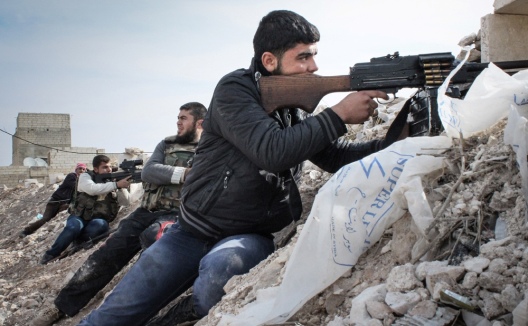 The most significant development in the Syrian conflict is neither chemical weapons disarmament nor international posturing over the Geneva II process, but US engagement with the newly-formed Jabha al-Islamiyya, or Islamic Front—a coalition of Islamist nationalist militia. After two and a half years of hand-wringing, meandering, and denial, US strategy in Syria finally began to reflect reality and a sad but compelling logic.
The most significant development in the Syrian conflict is neither chemical weapons disarmament nor international posturing over the Geneva II process, but US engagement with the newly-formed Jabha al-Islamiyya, or Islamic Front—a coalition of Islamist nationalist militia. After two and a half years of hand-wringing, meandering, and denial, US strategy in Syria finally began to reflect reality and a sad but compelling logic.
Looking back to the early days of the 2011 uprising—to the palpable joy and optimism of protestors who expected Bashar al-Assad to step down without much resistance—it is difficult to imagine the peaceful protest movement would be overshadowed, then extinguished, by the twin evils of the regime and transnational jihadists. Today, Syrian civilian activists are being driven out of the country by relentless violence by the regime and religious fanatics. There are few peaceful protests in Syria these days.
The rise of jihadist rebels appears to vindicate earlier US anxiety about and opposition to arming the rebellion, but this is a disingenuous argument. There was nothing inevitable about the religious radicalization of the uprising. It was certainly not preordained that non-Islamist rebels of the Free Syrian Army (FSA) would fare poorly in combat and be marginalized and eventually attacked by better-armed and funded jihadists. This eventuality resulted from abandoning the FSA to the tender mercies of the regime and religious radicals who openly reject the Syrian nationalist cause.
The empowerment of fanatics gave rise to a new argument in US policy circles and the media against helping the rebels: While it may have been a mistake to abandon the Free Syria Army, so the argument goes, it would surely be wrong to provide arms now given the rebellion’s radicalization. The war in Syria is now allegedly a war between the regime and jihadists—indeed, for proponents of this argument, a regime victory may even be preferable. Through intellectual acrobatics and feigned regret, those partly responsible for Syria’s nightmare can claim to be redeemed.
Reality in Syria, however, has stubbornly failed to conform with such self-serving arguments. Saudi Arabia, Qatar and other regional players opposed to Assad and Iran have filled the vacuum left by an absent United States. Their efforts, interests, ideology, and willingness to deal with Syria as it is and not as they wish it were have facilitated the emergence of a broad coalition of Islamist nationalist rebel groups, under the umbrella of Islamic Front. It is the Islamic Front that United States has now engaged, in an effort to build support for the Geneva II peace negotiations.
Gradually and very grudgingly, the Obama administration is accepting that this increasingly capable rebel coalition, falling between secular nationalists and transnational takfiri jihadists on the ideological spectrum, is emerging as the rebellion’s most important actor (or set of actors). This reveals a deeper and long overdue realization in US thinking about Syria: that contrary to the odd US insistence that arming the rebellion would ‘militarize’ the situation and make a settlement less likely, it is precisely the most well-armed and military capable fighting forces who will decide whether and how the war in Syria ends.
The Islamic Front is also the rebel group best placed to contain and eventually destroy the takfiri Islamic State of Iraq and Sham (ISIS), whose sociopathic violence and cruelty is matched only by that of the regime and its shabiha. The US obsession with the ISIS threat is not misplaced—certainly not in the eyes of its Syrian victims—but, largely due to the US abandonment of the FSA, destroying ISIS will now require the cooperation of rebel groups whose Islamist agenda is unpalatable to the United States.
The decline of the FSA, rise of ISIS, and increasing relevance of the Islamic Front shows how US paralysis, due to its fear of unintended consequences, led to precisely those consequences it feared most. It is not too late to save Syria from the worst possible outcomes—victory for either the regime or the takfiri jihadists—but it will require engaging with the issues on terms far less favorable and desirable to the United States.
Faysal Itani is a fellow with the Atlantic Council’s Rafik Hariri Center for the Middle East.
Image: Free Syrian Army rebels fighting against Assad militias on the outskirts of the northwestern city of Maraat al-Numan. (Photo: FreedomHouse/Flickr)
